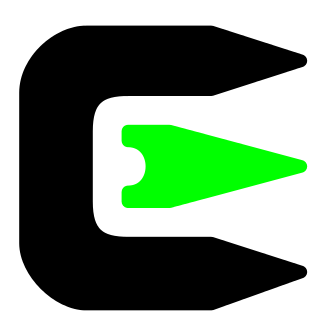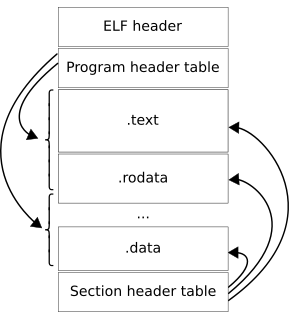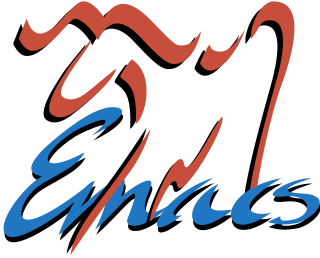Related Research Articles

Cygwin is a POSIX-compatible programming and runtime environment that runs natively on Microsoft Windows. Under Cygwin, source code designed for Unix-like operating systems may be compiled with minimal modification and executed.

In computing, the Executable and Linkable Format, is a common standard file format for executable files, object code, shared libraries, and core dumps. First published in the specification for the application binary interface (ABI) of the Unix operating system version named System V Release 4 (SVR4), and later in the Tool Interface Standard, it was quickly accepted among different vendors of Unix systems. In 1999, it was chosen as the standard binary file format for Unix and Unix-like systems on x86 processors by the 86open project.
The editor war is the rivalry between users of the Emacs and vi text editors. The rivalry has become a lasting part of hacker culture and the free software community.

GNU is an extensive collection of free software, which can be used as an operating system or can be used in parts with other operating systems. The use of the completed GNU tools led to the family of operating systems popularly known as Linux. Most of GNU is licensed under the GNU Project's own General Public License (GPL).

In computing, a linker or link editor is a computer system program that takes one or more object files and combines them into a single executable file, library file, or another "object" file.

XEmacs is a graphical- and console-based text editor which runs on almost any Unix-like operating system as well as Microsoft Windows. XEmacs is a fork, based on a version of GNU Emacs from the late 1980s. Any user can download, use, and modify XEmacs as free software available under the GNU General Public License version 2 or any later version.

In computer science, a library is a collection of non-volatile resources used by computer programs, often for software development. These may include configuration data, documentation, help data, message templates, pre-written code and subroutines, classes, values or type specifications. In IBM's OS/360 and its successors they are referred to as partitioned data sets.

The GNU Project is a free software, mass collaboration project that Richard Stallman announced on September 27, 1983. Its goal is to give computer users freedom and control in their use of their computers and computing devices by collaboratively developing and publishing software that gives everyone the rights to freely run the software, copy and distribute it, study it, and modify it. GNU software grants these rights in its license.
MinGW, formerly mingw32, is a free and open source software development environment to create Microsoft Windows applications. The development of the MinGW project has been forked with the creation in 2005–2008 of an alternative project called Mingw-w64.

LAMP is an acronym denoting one of the most common solution stacks for many of the web's most popular applications. However, LAMP now refers to a generic software stack model and its components are largely interchangeable.

Mathomatic is a free, portable, general-purpose computer algebra system (CAS) that can symbolically solve, simplify, combine, and compare algebraic equations, and can perform complex number, modular, and polynomial arithmetic, along with standard arithmetic. It does some symbolic calculus, numerical integration, and handles all elementary algebra except logarithms. Trigonometric functions can be entered and manipulated using complex exponentials, with the GNU m4 preprocessor. Not currently implemented are general functions like f(x), arbitrary-precision and interval arithmetic, and matrices.
In computing, a dynamic linker is the part of an operating system that loads and links the shared libraries needed by an executable when it is executed, by copying the content of libraries from persistent storage to RAM, filling jump tables and relocating pointers. The specific operating system and executable format determine how the dynamic linker functions and how it is implemented.

Linux is a family of open-source Unix-like operating systems based on the Linux kernel, an operating system kernel first released on September 17, 1991, by Linus Torvalds. Linux is typically packaged in a Linux distribution.
Dynamic loading is a mechanism by which a computer program can, at run time, load a library into memory, retrieve the addresses of functions and variables contained in the library, execute those functions or access those variables, and unload the library from memory. It is one of the 3 mechanisms by which a computer program can use some other software; the other two are static linking and dynamic linking. Unlike static linking and dynamic linking, dynamic loading allows a computer program to start up in the absence of these libraries, to discover available libraries, and to potentially gain additional functionality.

GNU Emacs is a free software text editor. It was created by GNU Project founder Richard Stallman. In common with other varieties of Emacs, GNU Emacs is extensible using a Turing complete programming language. GNU Emacs has been called "the most powerful text editor available today". With proper support from the underlying system, GNU Emacs is able to display files in multiple character sets, and has been able to simultaneously display most human languages since at least 1999. Throughout its history, GNU Emacs has been a central component of the GNU project, and a flagship of the free software movement. GNU Emacs is sometimes abbreviated as GNUMACS, especially to differentiate it from other EMACS variants. The tag line for GNU Emacs is "the extensible self-documenting text editor".

A Unix-like operating system is one that behaves in a manner similar to a Unix system, while not necessarily conforming to or being certified to any version of the Single UNIX Specification. A Unix-like application is one that behaves like the corresponding Unix command or shell. There is no standard for defining the term, and some difference of opinion is possible as to the degree to which a given operating system or application is "Unix-like".

Unix is a family of multitasking, multiuser computer operating systems that derive from the original AT&T Unix, whose development started in 1969 at the Bell Labs research center by Ken Thompson, Dennis Ritchie, and others.
The following outline is provided as an overview of and topical guide to the Perl programming language:
References
- 1 2 W. Wilson Ho; Ronald A. Olsson (1991). "An approach to genuine dynamic linking". Software: Practice and Experience. 21 (4): 375–390. CiteSeerX 10.1.1.37.933 . doi:10.1002/spe.4380210404.
- ↑ "dld". GNU Project. Free Software Foundation. Retrieved 14 October 2013.